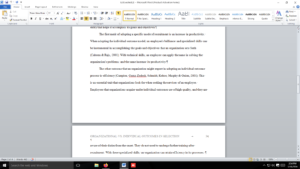Organizational citizenship behavior
Traditional individual outcomes expected of a personnel selection process might include increasing desired levels of work performance, job satisfaction, and employee morale. On an organizational level, expectations may relate more to acceptable levels of productivity, low turnover, and promotion of organizational citizenship behavior. Often, there is greater focus by human resource activities on expected individual outcomes and not those needed by the organization. It is important to assess and foster solid outcomes for both the individual employee as well as the organizational employer (Wilk & Cappelli, 2003).
Post by Day 4 explanations of three outcomes an organization might expect from its personnel selection processes. Explain whether these outcomes are consistent with those desired by job candidates, and provide rationale for any inconsistencies. Provide concrete examples and citations from the Learning Resources and current literature to support your post.
Hi please use at least 3 of the attached articles in APA 7th, thank you. Feel free to use additional resources if you wish.
References:
Requirements: | .doc file | Essay | 1 pages, Double spaced
Answer preview
The first merit of adopting a specific mode of recruitment is an increase in productivity. When adopting the individual outcome model, an employee’s brilliance and specialized skills can be instrumental in accomplishing the goals and objectives that an organization sets forth (Cabrera & Raju, 2001). With technical skills, an employee can apply the same in solving the organization’s problems, and the same increase its productivity.
The other outcome that an organization might expect in adopting an individual outcome process is efficiency (Campion, Outtz, Zedeck, Schmidt, Kehoe, Murphy & Guion, 2001). This is an essential trait that organizations look for when seeking the services of an employee.
[462 Words]

Organizational citizenship behavior

